Key takeaways:
- Transitional housing provides essential resources like job training and mental health support, helping residents regain stability and confidence.
- Community support plays a crucial role in fostering a sense of belonging and emotional encouragement, significantly impacting personal growth and resilience.
- Challenges such as stigma and resource accessibility highlight the need for tailored support systems for residents transitioning to permanent housing.
- Personal growth is often facilitated through creative expression and goal-setting, proving that transitional housing can be a transformative experience beyond just providing shelter.
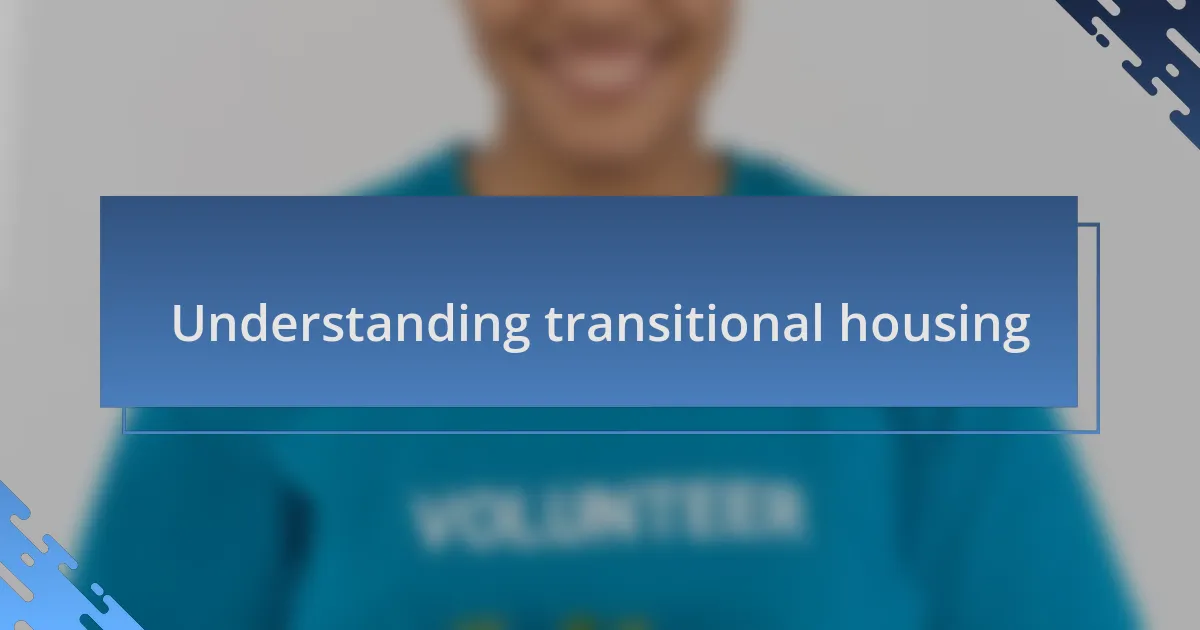
Understanding transitional housing
Transitional housing serves as a vital bridge for individuals moving from homelessness to permanent living. I remember a friend who spent three months in a supportive transitional program. It provided not just a roof over his head, but stability and resources that enabled him to plan for the future—something he desperately needed at the time.
In these environments, residents often gain access to essential services, including job training and mental health support. I’ve seen people flourish in such settings, reclaiming their sense of self-worth and purpose. Have you ever considered how such a supportive framework could transform lives? It’s heartening to think about the potential for change when individuals receive the help they need to regain their footing.
Understanding transitional housing goes beyond mere shelter. It’s about building a community where individuals can connect and support one another. I once participated in a workshop with residents who shared stories of resilience and hope. Their journeys reminded me that empathy and understanding can create a powerful foundation for success, making the concept of transitional housing not just a necessity, but a beacon of hope.
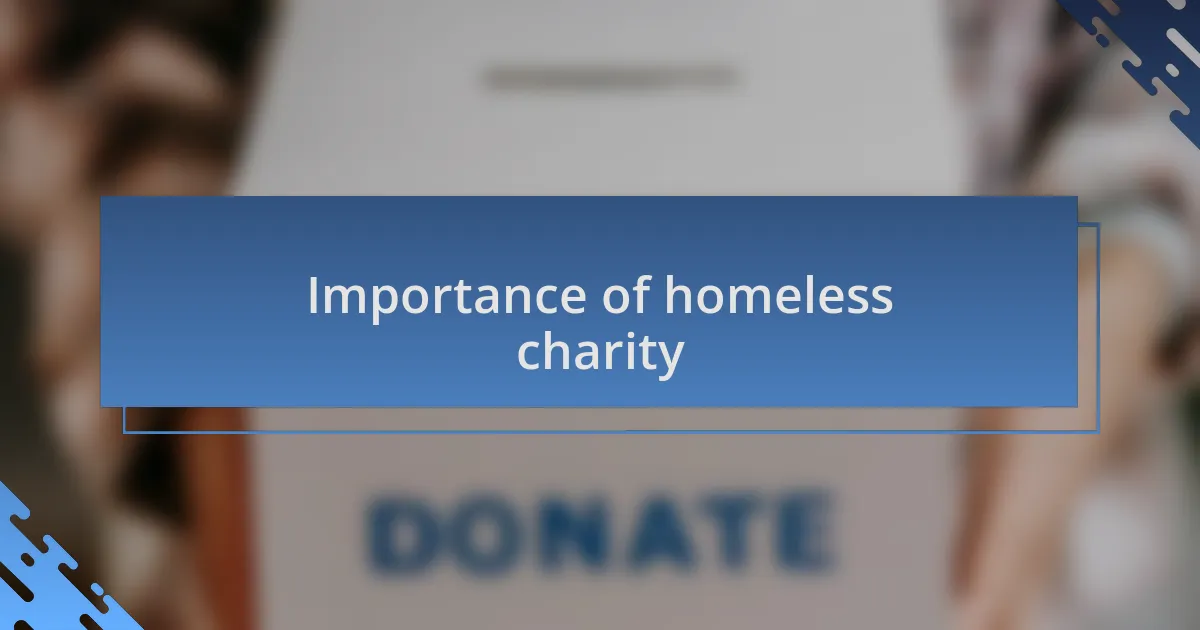
Importance of homeless charity
The importance of homeless charity cannot be overstated. In my experience, organizations dedicated to helping the homeless not only provide immediate relief but also instill a sense of dignity in individuals. I recall volunteering at a local soup kitchen, where the smiles of those we served reminded me that simple acts of kindness can restore hope and ignite desire for a brighter future.
Charitable efforts often create a safety net that allows individuals to focus on rebuilding their lives. I once talked to a woman who had just secured a stable job after receiving support from a local charity. She expressed how much it meant to her that someone believed in her when she felt like giving up. Isn’t it remarkable how the support of a community can truly change someone’s path?
Moreover, homeless charity fosters awareness and empathy within society. When I attended a fundraising event, I listened to stories that resonated deeply with me. They served as crucial reminders that everyone has a story worth telling, and by supporting homeless charities, we contribute to a culture that values compassion and understanding. This creates ripple effects that can lead to lasting social change.
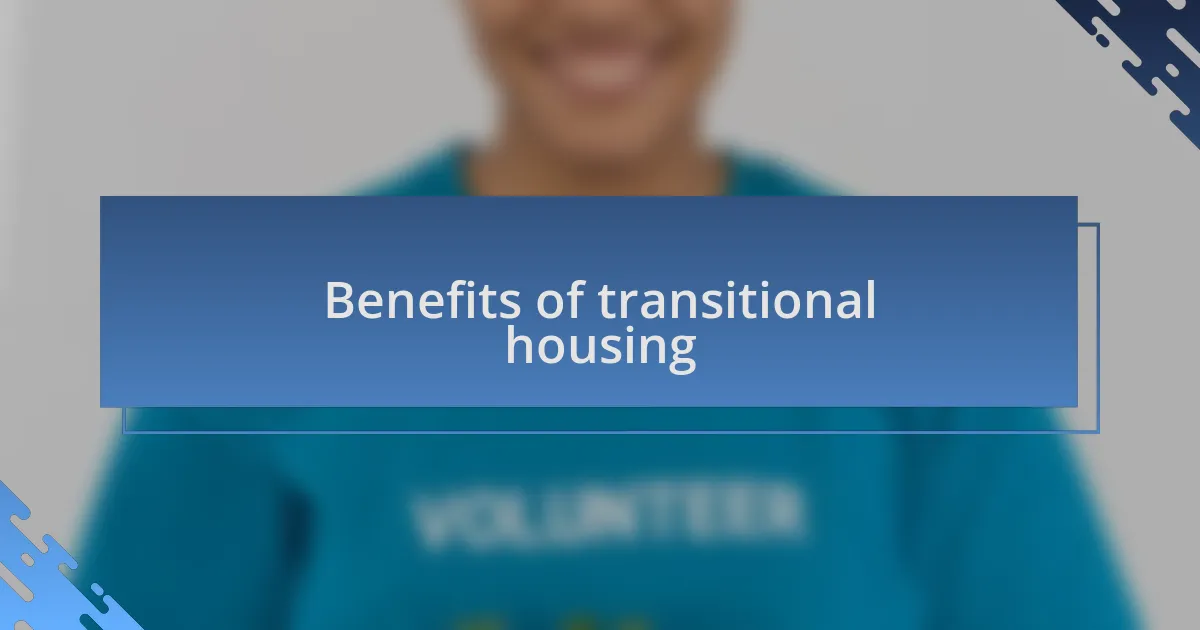
Benefits of transitional housing
Transitioning into stable housing offers numerous benefits that can significantly impact individuals and families experiencing homelessness. For example, during my time volunteering with transitional housing programs, I noticed how having a stable place to stay provided residents with the security they needed to seek employment and reconnect with their families. It’s transformative to witness someone flourishes when they finally have a roof over their head.
What struck me the most was the sense of community that often develops in transitional housing environments. I remember a case where neighbors formed support groups to share resources and advice, creating a network that bolstered everyone’s confidence. Isn’t it remarkable how collective support can turn daunting challenges into manageable steps?
Additionally, these programs often offer crucial services like job training and mental health support. I met a young man who, with the assistance of career counseling offered through his transitional home, landed an internship that eventually led to a full-time job. He shared that the confidence he gained from working with supportive staff made all the difference in his journey towards self-sufficiency.
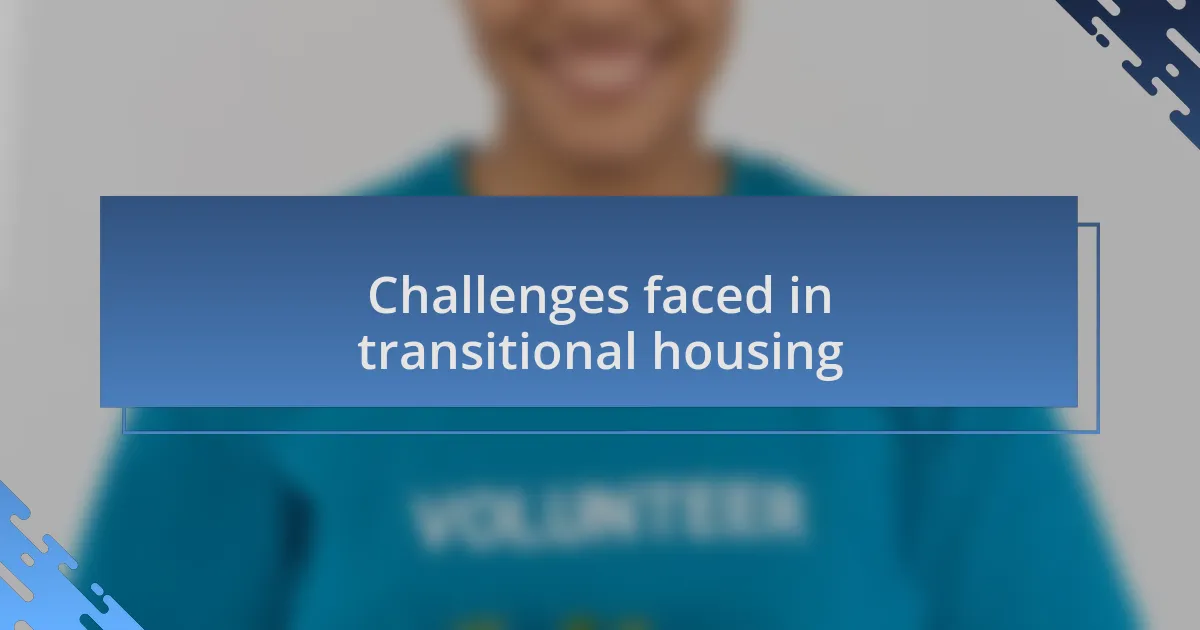
Challenges faced in transitional housing
Living in transitional housing comes with its own set of challenges that can feel overwhelming at times. From my observations, many residents struggle with adjusting to the structured environment after having faced the unpredictability of homelessness. I vividly recall a woman who shared how difficult it was for her to adapt to the rules, highlighting the emotional turmoil that often accompanies such changes. Isn’t it fascinating how the smallest guidelines can feel like overwhelming hurdles when you’re trying to find your footing?
Another significant challenge often revolves around the stigma attached to transitional housing. I remember speaking with a resident who mentioned feeling judged by others in the community. This stigma can lead to feelings of isolation, which counteracts the very support that these programs aim to provide. How can we break this cycle of judgment and foster empathy instead? It’s essential to nurture understanding within communities to help residents reintegrate with confidence and dignity.
Moreover, accessing resources like mental health support can be a daunting task for many individuals in transitional housing. I encountered a young mother who was struggling to secure therapy for her past traumas while juggling childcare and job searching. The stress of navigating these layers can be paralyzing. Isn’t it crucial that support systems adapt to the multifaceted needs of those they aim to help? It’s a reminder that while transitional housing provides a vital stepping stone, additional tailored support is necessary to truly empower residents on their journey toward stability.
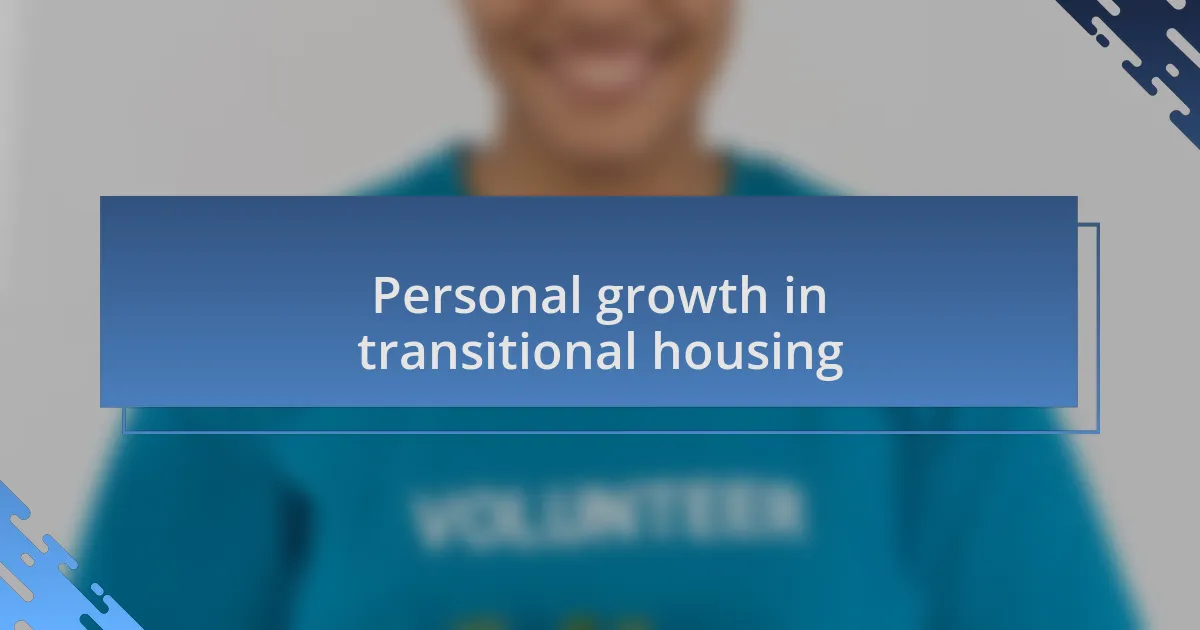
Personal growth in transitional housing
Personal growth in transitional housing often occurs in unexpected ways. For instance, I remember a resident who discovered her passion for art during her time in a transitional program. She started using her talents to express her experiences, ultimately leading to personal healing and a renewed sense of identity. Isn’t it remarkable how creativity can bloom in even the most challenging circumstances?
As individuals navigate their new environments, they confront and often overcome long-held fears. I once met a gentleman who had always struggled with social anxiety. By participating in community activities organized within the housing program, he gradually learned to communicate and connect with others. This transformation was nothing short of inspiring. Could it be that the very challenges we face serve as catalysts for our resilience and growth?
Moreover, many discover the power of setting goals during their time in transitional housing. I spoke with a young woman who initially felt lost but found clarity by outlining her aspirations for the future. This simple act of envisioning her life beyond the program became a driving force, motivating her to pursue education and job opportunities. Isn’t it fascinating how defining our intentions can chart a course for our lives? The journey through transitional housing can truly ignite personal growth in ways that transform not only individual lives but also their communities.
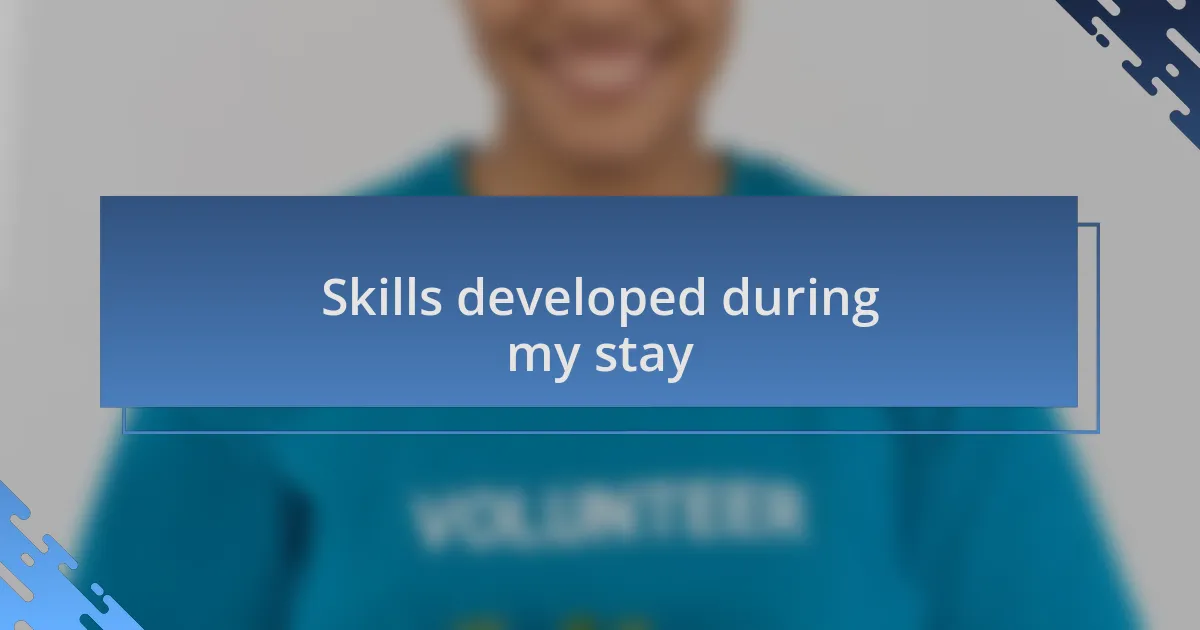
Skills developed during my stay
During my stay in transitional housing, I developed essential life skills that I never expected to acquire. For example, I learned basic cooking techniques that not only improved my nutrition but also boosted my confidence. There were nights I cooked for the group, and seeing everyone enjoy my meals filled me with a sense of purpose and accomplishment. Isn’t it amazing how something as simple as cooking can create connections?
In addition to culinary skills, I honed my financial literacy. I remember sitting down with a volunteer who guided me through budgeting and saving. At first, numbers felt overwhelming, but with practice, I began to understand how to manage my expenses. This newfound knowledge gave me a sense of control over my life. How empowering is it to gain the skills that lead to financial independence?
I also found myself developing strong communication and conflict-resolution skills. Living with others in close quarters meant that disagreements were inevitable. I recall a time when a misunderstanding arose about shared responsibilities. Instead of letting it fester, I initiated a group discussion. That conversation not only resolved the issue but also deepened our sense of community. Could it be that navigating challenges together strengthens our bonds and prepares us for future interactions?
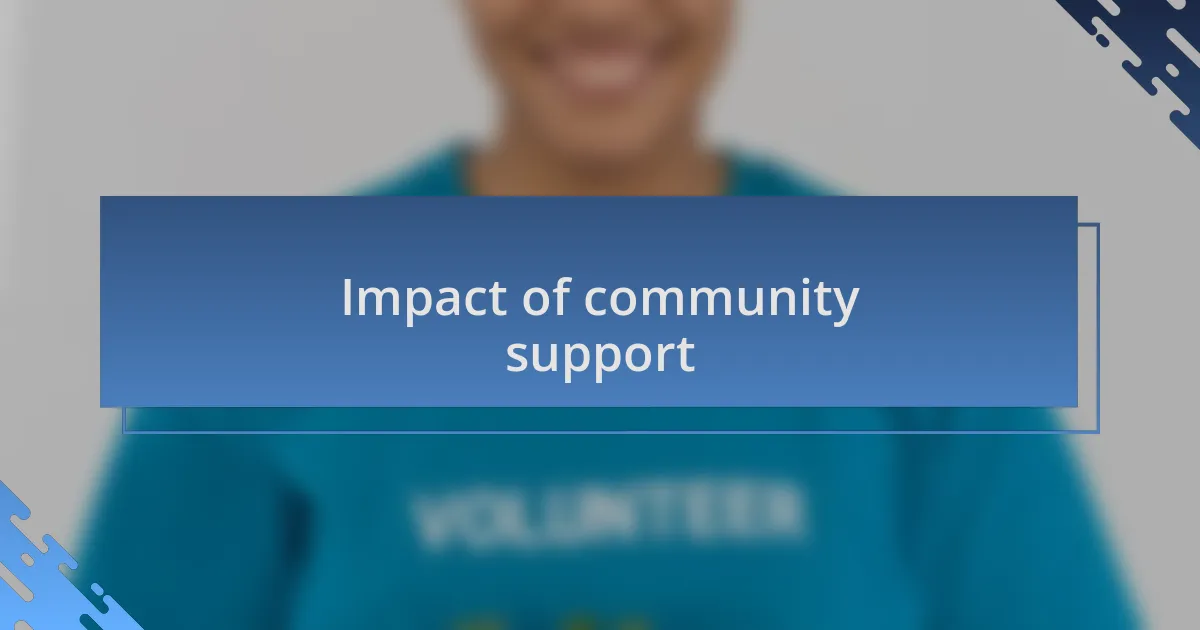
Impact of community support
It’s truly remarkable how community support can transform lives in transitional housing. I vividly remember the day a local business held a donation drive. The volunteers arrived with clothes, hygiene products, and even household items. When I saw my neighbors’ faces light up with gratitude, I felt an overwhelming sense of solidarity. Isn’t it heartwarming to see how a simple gesture can uplift an entire community?
Beyond material support, the emotional encouragement we received was invaluable. I participated in several group activities organized by volunteers, including art therapy sessions where we shared our stories through creativity. These moments fostered trust and vulnerability among us, reminding me that we weren’t alone in our struggles. How often do we underestimate the power of sharing experiences to forge deeper connections?
Even the smallest acts of kindness from community members had a lasting impact on my journey. One day, a woman from a nearby neighborhood stopped by to chat. She not only listened but also shared tips on job searching that turned out to be incredibly helpful. That genuine interaction taught me the significance of reaching out—sometimes, it’s the personal touch that makes the most significant difference. Wouldn’t it be great if everyone took a moment to lend an ear to someone in need?